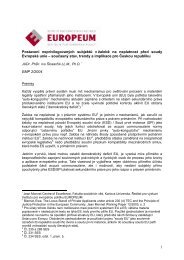eu constitutionalisation - EUROPEUM Institute for European Policy
eu constitutionalisation - EUROPEUM Institute for European Policy
eu constitutionalisation - EUROPEUM Institute for European Policy
You also want an ePaper? Increase the reach of your titles
YUMPU automatically turns print PDFs into web optimized ePapers that Google loves.
Chapter 4: Government Coalitions and Institutional Re<strong>for</strong>m at the IGCSUMMARY¹This article argues that IGC negotiations can be viewed as social interactionbetween predominantly coalitions of governments that put <strong>for</strong>ward proposalson the scope and terms of cooperation within the framework of the EU.Coalitions are defined here as groups of states which coordinate their positionsand act cooperatively on all or some negotiation issues. The articlefocuses specifically on EU governments’ coalitional behaviour in the partof the 2003/04 IGC negotiations that dealt with the re<strong>for</strong>m of institutions,which was, arguably, the most contested in the examined case. Four prominentcoalitions are identified and their characteristics and ‘binding factors’explained: the Franco-German, the Spanish-Polish, the Benelux, and the‘Friends of the Community Method’. In addition, the coalitional behaviourof the UK and Italy is also analysed.INTRODUCTIONThe 2003/04 Intergovernmental Conference [IGC] was unique in the historyof EU treaty negotiations <strong>for</strong> three main reasons. First, it was the firstnegotiation exercise among the EU-25 with its substantively larger numberof member states than the previous EU-15. Even though the ten candidatestates had not yet <strong>for</strong>mally joined the EU by the time the IGC started, the<strong>European</strong> Council decided that they would fully participate in the IGC.²Second, the pre-negotiation phase of the IGC was conducted in the novel<strong>for</strong>um of the Convention on the Future of Europe. The Convention prepareda Draft Treaty which framed the agenda <strong>for</strong> the IGC negotiations. Finally,the IGC concluded with the member states’ agreement on the first-eversingle-text constitutional treaty <strong>for</strong>mulation of the constitutional order of the<strong>European</strong> Union [EU]. Although in view of the negative referenda results inthe Netherlands and France the future of the constitutional treaty is uncertain,it has nevertheless made an important mark on the constitutional develop-1) The author would like to that the participants of the Graduate Workshop on “The Constitutional Treaty:Anatomy, Analysis and Assessment”, and especially Prof. Renaud Dehousse and Prof. Wolfgang Wessels <strong>for</strong>their constructive feedback to the earlier version of this article. Thanks go also to Dr. Julie Smith <strong>for</strong> her carefulreading of and comments on the final version of this article. The author would also like to thank UACES andthe <strong>European</strong> Commission <strong>for</strong> supporting the empirical research conducted in Brussels in 2004.2) The accession of Czech Republic, Cyprus, Estonia, Hungary, Latvia, Lithuania, Malta, Poland, Slovakiaand Slovenia took place on 1 May 2004 following the signature of the Accession Treaties on 16 April2003 in Athens.100Chapter 4: Government Coalitions and Institutional Re<strong>for</strong>m at the IGCment of the EU. Unsurprisingly then, a lot of scholarly attention has beenconcentrating on studying legal and political aspects of this treaty re<strong>for</strong>m.This article adds to this literature by directing the analysis of the constitutionalpolitics of the 2003/04 IGC to the as yet relatively unexplored area of thecoalitional behaviour of EU governments. In EU negotiations in general,coalitional behaviour is seen as a typical, even inevitable part of EU decision-making,in the areas covered by the majority-voting rules as well as inareas of unanimous decisions.³ It becomes even more important with EUenlargement, which increases the number of players in EU decision-making.⁴This article argues that IGC negotiations can be viewed as social interactionbetween predominantly coalitions of governments that put <strong>for</strong>ward proposalson the scope and terms of cooperation within the framework of the EU.Coalitions are defined here as groups of states who coordinate their positionsand act cooperatively on all or some negotiation issues.⁵ As pointed out bynegotiation scholars, the choice of coalitional behaviour is one of the keystrategy choices <strong>for</strong> governments involved in multilateral negotiations.⁶It is surprising then that not more scholarly attention has been dedicatedto the analysis of EU coalitions.⁷ This is particularly the case concerningcoalitional behaviour in a unanimity-rule setting, such as treaty negotiations.Although nearly every account of treaty re<strong>for</strong>m negotiations makes somereference to coalition-<strong>for</strong>mation and dynamics, ⁸ almost none of these worksmakes conceptual distinctions between different coalitions that emerge, orinvestigates systematically why and how these coalitions came about. Thereare two prominent exceptions, however.One work that focuses explicitly on coalitions associated with treaty negotiationsis ‘On Cores and Coalitions in the <strong>European</strong> Union’ edited by Pijpers.⁹Pijpers’ edited work includes a series of article addressing the ‘cores’ andcoalition patterns in the EU at the time of the 2000 IGC, paying special3) Elgström et al (2001): 114; Wallace (1990): 222-223.4) Elgström et al (2001); Hosli (1999).5) Najam (2001): 31.6) Midgaard and Underdal (1977).7) Many scholars perceive that there is a dearth of scholarly work on governments’ coalition behaviour andcoalition patterns within the EU. Elgström et al. (2001): 112; Kaeding and Selck (2005): 272.8) Beach (2005); Closa and Fossum (eds.) (2004); Edwards and Pijpers (1997); Laursen (1992); Laursen (ed.)(2002); Laursen and Vanhoonacker (eds.) (<strong>for</strong>thcoming January 2006); Moravcsik (1999); Stubb (2002).9) Pijpers (ed.) (2000).101








